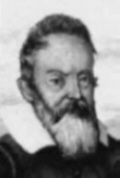 |
Natural philosopher. Born
15.2.1564 in Pisa .Died 8.1.1642 in Arcetri near Florence. Founder of modern
physics based on studies and experiments. As a student he observed the
isochronism of the oscillations of pendulums of equal lengths. He invented
the hydrostatic balance to determine specific weights and established the
laws of falling bodies in Pisa in 1589. 3 years later he was appointed
to the chair of mathematics at the University of Padua. The construction
of a telescope in 1609 enabled him to discover hills and valleys on the
surface of the moon, discover the satellites of Jupiter, the spots on the
sun, verify the phases of Venus and so on. In 1610 he was called to Florence
where he clashed with the church when he credited the heliocentric world
system of Copernicus and was subsequently committed to silence in 1616.
During 1626-1630 he wrote his first great work “ Dialogue on the
two chief world systems” in which he made a renewed attempt to prove
the truth of the heliocentric world system. In 1633 he was tried before
the Inquisition in Rome on charges of insubordination and heresy. He was
forced to renounce his theories and remained prisoner of the Inquisition
until his death. In 1992 Galilei was publicly reinstated by Pope John Paul
II. |

